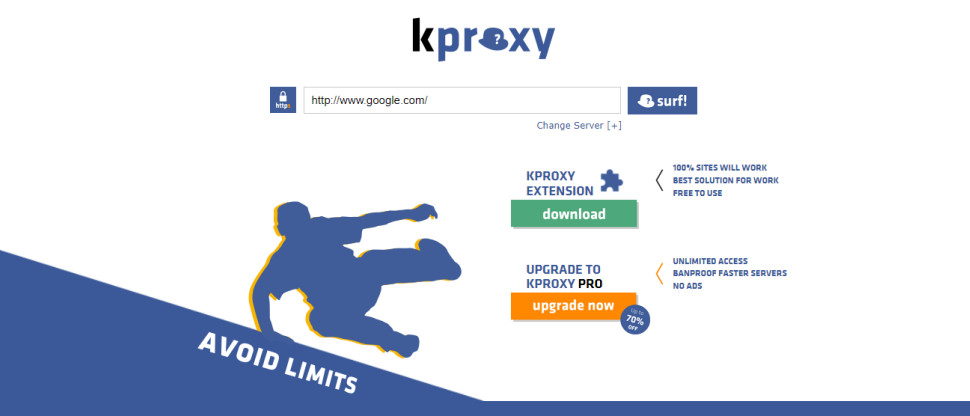TechRadar Verdict
Worth a try if you're looking for a simple free website unblocker, but don't buy the paid version; you can get far better VPNs for less.
Pros
- +
Easy to use
- +
Chrome, Firefox and Edge extensions
- +
Custom portable browser
- +
Unblocked Amazon Prime Video during testing
Cons
- -
Only two locations
- -
Logs details of how you use the service
- -
Free plan is time-limited
- -
Didn't unblock Netflix for us
Why you can trust TechRadar
KProxy is a popular free and paid proxy service which the company says has more than 1.5 million regular users.
There's plenty of proxy competition around, but KProxy stands out immediately for its lengthy track record (it's been around since 2005) and one or two very unusual features.
We're not just talking about some standard 'Block WebRTC' checkbox in Settings, either. KProxy has substantial extras you won't find anywhere else, including its own browser.
Features
You don't always know when or where you'll need a proxy service, but that's not a problem with KProxy: you can use it from just about anywhere.
A website is blocked on your current network, for instance? Enter its URL in a form on the KProxy site to try accessing it via one of ten public servers. You can't select a location for these, so they won't help you get into geoblocked sites, but they could bypass local network restrictions.
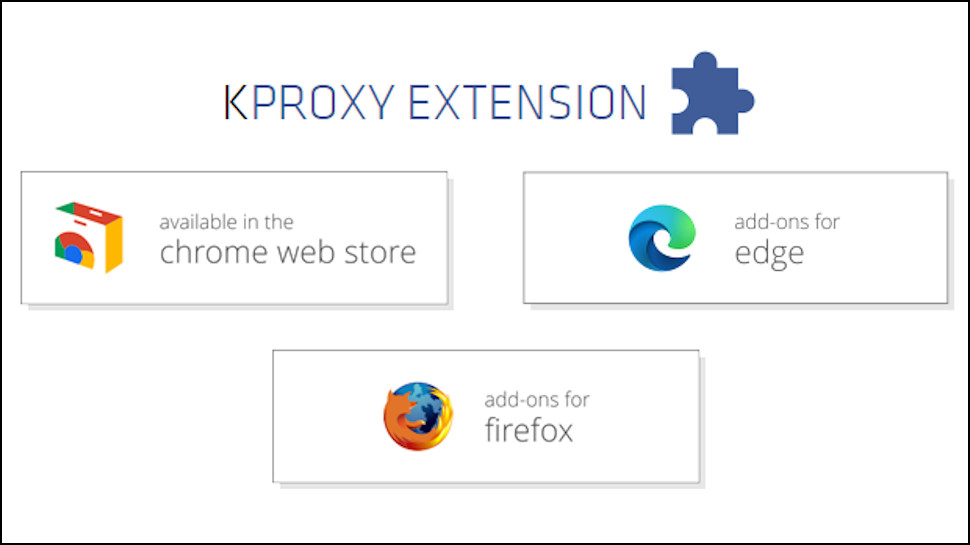
Looking for something more convenient? KProxy has browser extensions for Chrome, Firefox, Edge, even Android's Kiwi browser, a far better range than many big-name competitors (Hide.me has Chrome and Firefox extensions, HideMyAss!' only covers Chrome.)
KProxy even has a portable KProxy browser for windows. This isn't quite as impressive as it sounds - it's actually just PortableApps' version of Firefox with KProxy pre-installed - but it's an unusual touch, and gives you some interesting new options (more on that, later.)
Sign up to the TechRadar Pro newsletter to get all the top news, opinion, features and guidance your business needs to succeed!
Privacy policy
KProxy can be handy for unblocking websites, but it's not a full VPN. It only works with your browser, it doesn't encrypt your traffic, and it doesn't try to tell you it's a 'zero log' service. In fact, the Privacy Policy lists a huge number of details that are logged every time you use the service.
We're not just talking your IP address, web browser type, version, time zone, connection type and Wi-Fi network name. But the policy also talks about 'usage activity' including 'number of clicks on a page or feature, amount of time spent on a page or feature, identity of third-party websites, networks, platforms, servers and applications being access through the Website.)'
This isn't a great surprise - many proxy services do something similar - but it's worth keeping in mind. KProxy provides a simple way to access websites you might not be able to reach otherwise, but it's not a privacy, security or anonymity tool. If that's a concern, forget proxy services and sign up for a full VPN, instead.
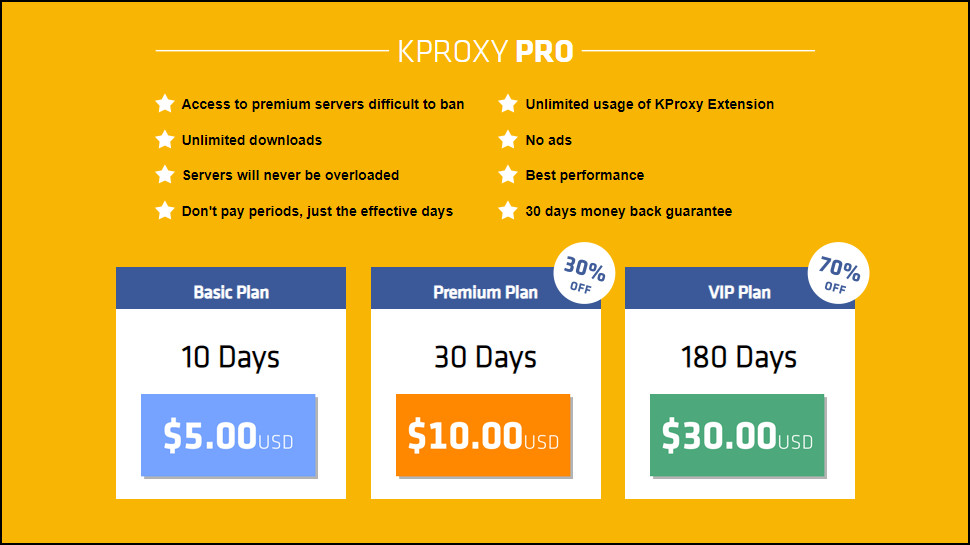
Pricing
KProxy's free plan limits you to two locations: Canada and France. That's not bad, but some providers give you a little more. HideMyAss! VPN Proxy Unblocker offers France, Germany, Netherlands, UK and USA with even its free version.
KProxy's free service also limits your access by time, closing the connection occasionally and requiring you to wait before you reconnect.
It's not clear how restrictive these conditions are. The website doesn't spell them out explicitly ('sessions are limited to 30 minutes, you can reconnect after a 15 minute delay'), saying only that you should upgrade for unlimited access.
In real-world use we found this generated some usability hassles. We regularly returned to our browser, having left it connected to KProxy, and found ourselves unable to access any websites. The solution was easy - just disconnect from KProxy - but it's still an irritation we don't see with similar products.
Upgrading to the paid edition removes all these annoyances, though, and adds four new locations: Germany, UK, USA East and USA West.
Prices look reasonable at $5 for 10 days, $10 for a month, or $30 for six months. But keep in mind that you can buy a full VPN service for less, in some cases. Private Internet Access has many more locations and features than KProxy, for instance, but it currently charges only $40 for one year's coverage, or $79 for three years and three months.
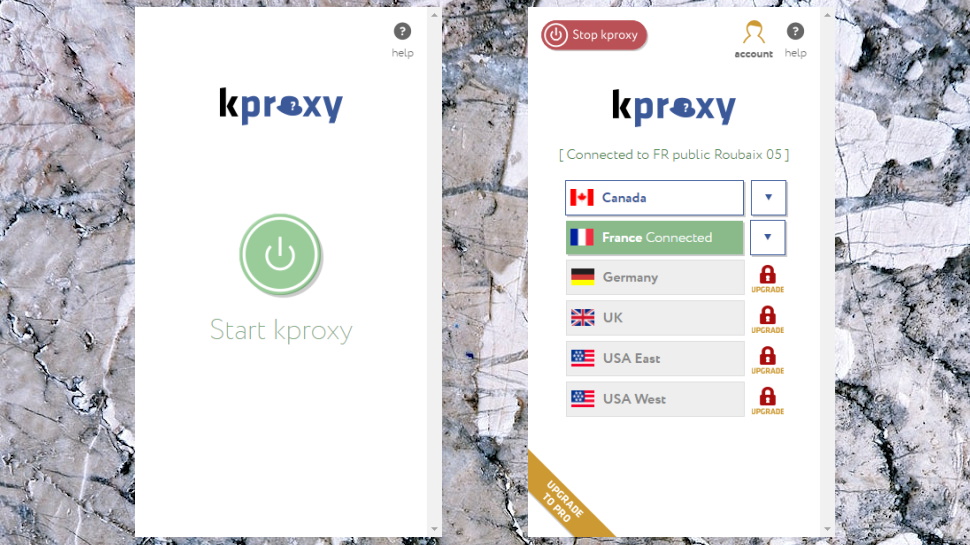
KProxy Chrome extension
KProxy's Chrome browser extension is as simple to use as it could possibly be. Tap the KProxy icon, a drop-down window appears with a big On button; tap that, you're connected; when you're finished, tap Stop and your connection is back to normal.
As KProxy's Chrome extension doesn't display a location up-front, it always connected us to Canada first. We could then switch to France with a click, but life would be just a little easier if we could do that in the first place.
KProxy does have one unusual bonus. You can access locations either by clicking the country name, or manually choosing a specific server ('CA public Montreal 07'), perhaps handy if other servers are blocked or overloaded.
That's where the advanced extras end, though. The extension doesn't have any smart settings or unexpected privacy bonuses - it's strictly proxies-only.
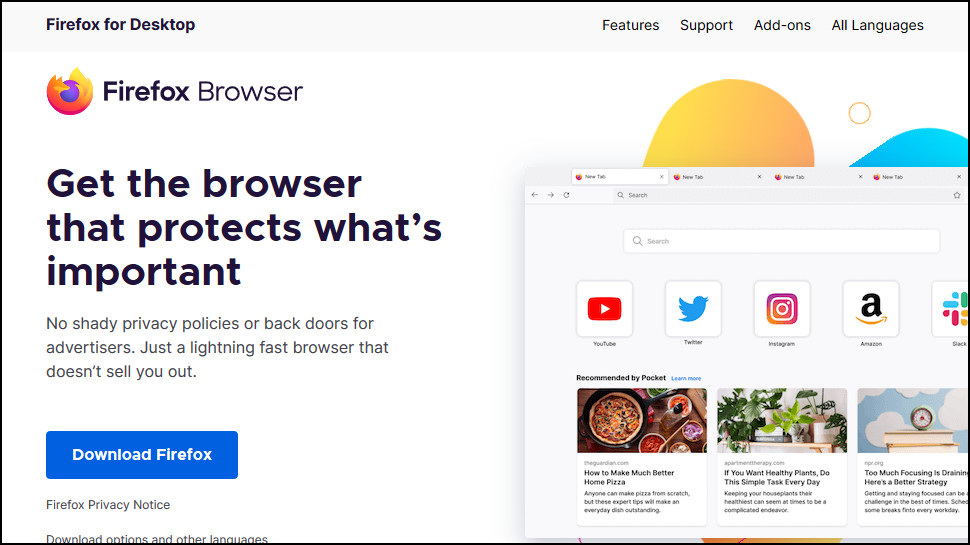
KProxy Browser
KProxy is the only consumer proxy service we know to have its own portable browser, so we were keen to see exactly how this worked.
The browser isn't KProxy's own project. It's based on the portable edition of Firefox developed for PortableApps, an open-source platform which makes it easy for users to run their favorite apps on other PCs without installing them.
One problem with this scheme is KProxy hasn't touched the browser for a very long time. It unzips Firefox 46.6.0.1 by default, and that was released back in 2016. We don't know precisely how many known security and privacy issues that has, but it's probably correct to describe it as 'a lot', and it's not safe to use the browser in its default state.
You can update it as usual, though, and once we've done that, KProxy Browser worked just as advertised. We were able to launch the browser from a removable storage device, and connect to the free Canadian or French locations, just as we did with the Chrome extension.
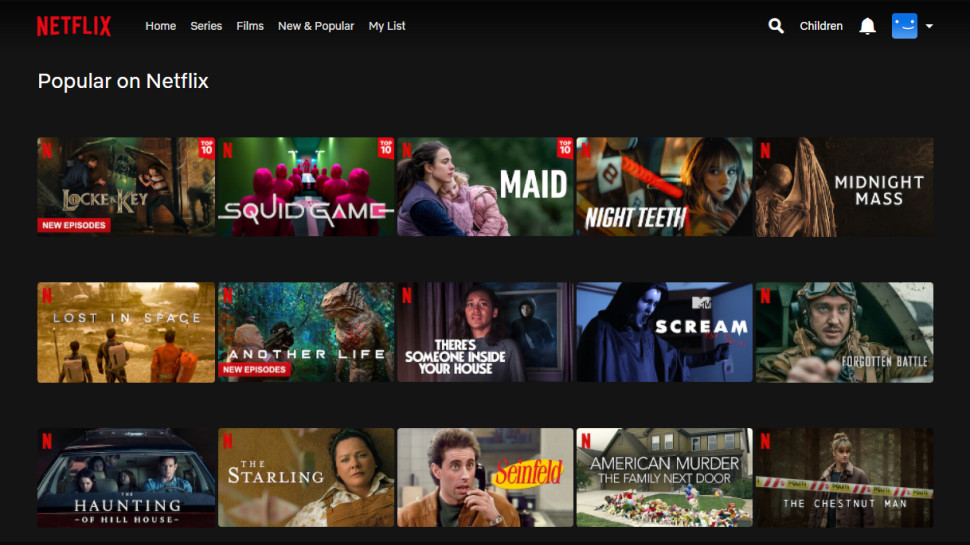
Performance
KProxy's time-limited free plan (combined with the lack of locations) mean this isn't an ideal platform for unblocking streaming sites, but were still interested to see how it performed.
Netflix results were, well, poor. It didn't just prevent us streaming content, it actually blocked us visiting the site at all (pointing our browser at Netflix.com got us a 403 'Forbidden' error.)
To be fair, though, many quality commercial VPNs also fail to unblock Netflix. And KProxy's free service more than made up for its Netflix issues by allowing us to stream Amazon Prime Video via its Canada servers (another task which defeats many VPNs.)
Speeds were reasonable, too, typically ranging from 25-50Mbps during our tests. That's more than enough for browsing and most streaming tasks, and not bad at all for a free service. KProxy claims upgrading gets you access to more high-powered servers for even better performance.
Final verdict
KProxy is a decent free proxy service which had far more unblocking success than we expected, but logging and usability issues make it tricky to recommend, and the paid service is relatively expensive for what you get.
We've also highlighted the best proxy and best VPN

Mike is a lead security reviewer at Future, where he stress-tests VPNs, antivirus and more to find out which services are sure to keep you safe, and which are best avoided. Mike began his career as a lead software developer in the engineering world, where his creations were used by big-name companies from Rolls Royce to British Nuclear Fuels and British Aerospace. The early PC viruses caught Mike's attention, and he developed an interest in analyzing malware, and learning the low-level technical details of how Windows and network security work under the hood.
